The Narrow Road to the Far North
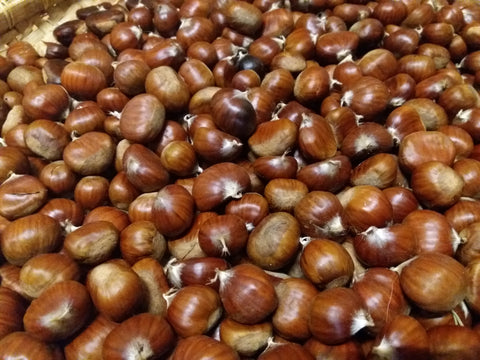
As the end of summer approached. an extended, very late, hot summer of forest fires and drought, the springs were running at a mere trickle and the moisture we come to expect, especially the heavy nightly dew simply failed to materialize. Disquiet turned to foreboding. Raw Carob honey,our most popular honey, comes at the end of the summer months and there was not going to be any Carob honey. I called every beekeeper I know, and they all did the same but the result was no different. No Carob honey to be found anywhere. It is a very rare honey, and limited to the central and eastern Algarve. Carob honey is possibly unique in that it is both a flower honey as well as a honeydew (also called "Melada" in Portuguese) The bees forage both on the nectar of the strange carob flowers as well as aphid secretions on the carob pods, but all of this requires moisture and warmth.
October came and went and there was not a jar of it to be had. Nature after all is not a factory. Complex, mature ecosystems are delicately balanced and easily upset by dramatic changes.
Here was a big disappointment for us as well as many of you who've grown to love this unique dark,rich, honey. So we resolved to find some new honey to take its place. A tall order.
My first thoughts went to Chestnut honey, but Chestnut honey comes from the other end of the country, the far North. I began to ask around but it seemed that it wasn't a great year for chestnut either....until on a slightly deflated afternoon, whilst browsing some of the agricultural listings i saw an advert for chestnut honey in bulk. A series of text messages with this unknown beekeeper resulted in first a sample, (and it was a lovely chestnut, with just the right amount and diversity of other flowers to be sweet and floral and nutty and complex.) then a honey analysis and finally an agreement. I had agreed to buy a 1000kg of Chestnut honey from someone I'd never seen. A first for me. We arranged for half of it to be shipped down, but the other half we resolved to collect it ourselves so that we could meet the man and see where his honey came from. Both the dogs came too. Roadtrips are a family affair.
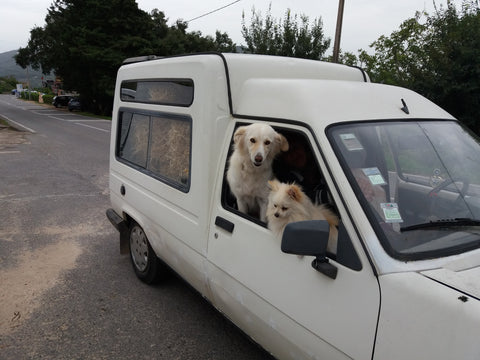
Travelling North we stayed at a little inn, Quinta do Seixo, sitting in an idyllic valley on the eastern edge of the Serra de Estrela run by Ofelia and Adolfo an elderly couple, sweet and generous to a fault. (and the makers of very fine Olive oil) They love honey too so Ofelia called up a local beekeeper friend of hers to introduce us
Sometimes you just get lucky...
Jose arrived promptly the next day, with two samples of exquisite honey, one was a lavender which was pure and light and exquisitely delicate and the other was viscous, aromatic, malty and dark, with a hint of fruit, utterly sublime. It turned out to be an Oak and chestnut honey, with woodland flowers and wild berry flowers. We have called it a Serra de Estrela mountain honey. Needless to say, I was sold and I know that for all you Carob honey fans you wont be disappointed.
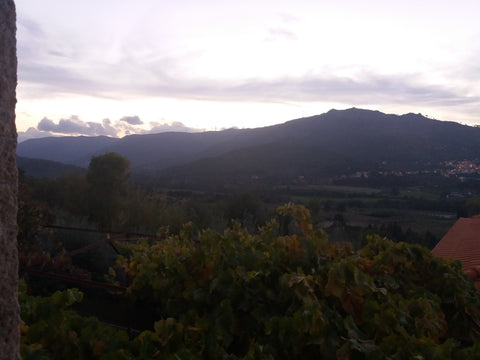
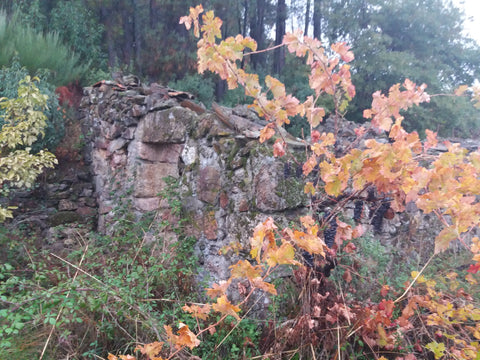
The New Talent..
The next morning we set off for our Chestnut rendez-vous and on a very wet and rainy afternoon we pulled into a small village an hour further north and met Pedro. I was shocked at how young he looked,. He's actually 30. ( I must be the one getting older). Pedro is not a multi-generational beekeeper, he took a beekeeping course at 20, loved it, got two hives, slowly built up to 200 and at 30 years of age is now an experienced beekeeper. He has the gentle soul of a good beekeeper. At a time when the craft is seeing an older generation die off, it's really heartening to see new young talented beekeepers who love what they do. He makes good sausages too..
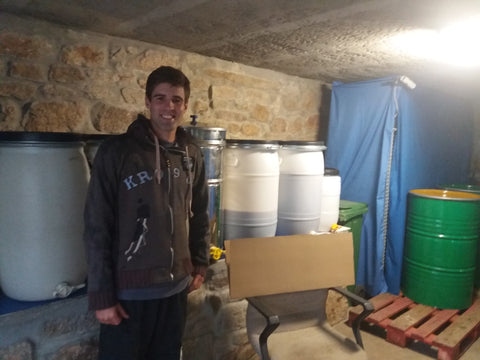 .
.
Meeting with the Master.
One long drive down, was followed two weeks later by another one back up to spend some time with Jose, the producer of the Mountain honey, Jose is a teacher of Apiculture and Master of his craft. Driving to his village, its easy to understand the nature of his honey, Its mile after mile of the colour of Oak trees in the autumn. We stopped at his home and farm, met the family, including the pet wild boar, raised from a foundling, ate things we'd never had before and drank things we probably shouldn't again, namely distilled grape alcohol with fresh grape juice. Now there's a drink. Abstention was not option.
. 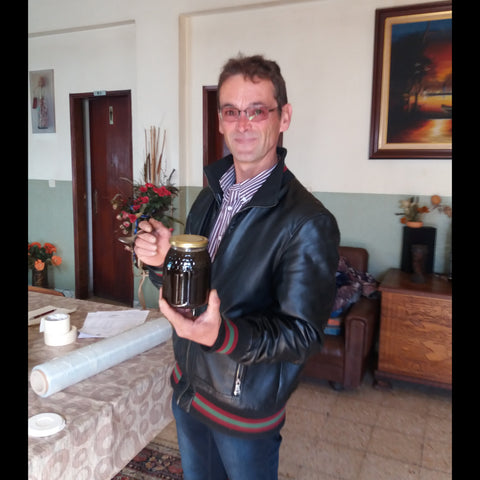
And so with deep thanks to the majestic Serra de Estrela mountains, Ofelia and Adolfo, Pedro and Jose and all the family, we have returned with our gifts from the North. We are well pleased and we have a suspicion you might be too.
Raw Chestnut Honey and Raw Serra de Estrela Mountain Honey will be available next week. Happy waiting.

Comments on this post (1)
What a fascinating story! We holiday in Portugal sometimes (in wintertime) and have been to Monchique, but never this far north. So interesting to read the story of the mountain honey……it truly is delicious…….so good to see the people involved. We first tasted carob honey in Cyprus and were hooked, so tried to buy it on the internet when we came home and found yours, Portuguese honey was even better, darker and richer. We also love the raw Arbutus honey, but now truly hooked on your Sera de Estrela mountain honey as well.
We know how beautiful and unspoilt the Portuguese countryside is, and love to travel around and explore.
— Barbara Johnson